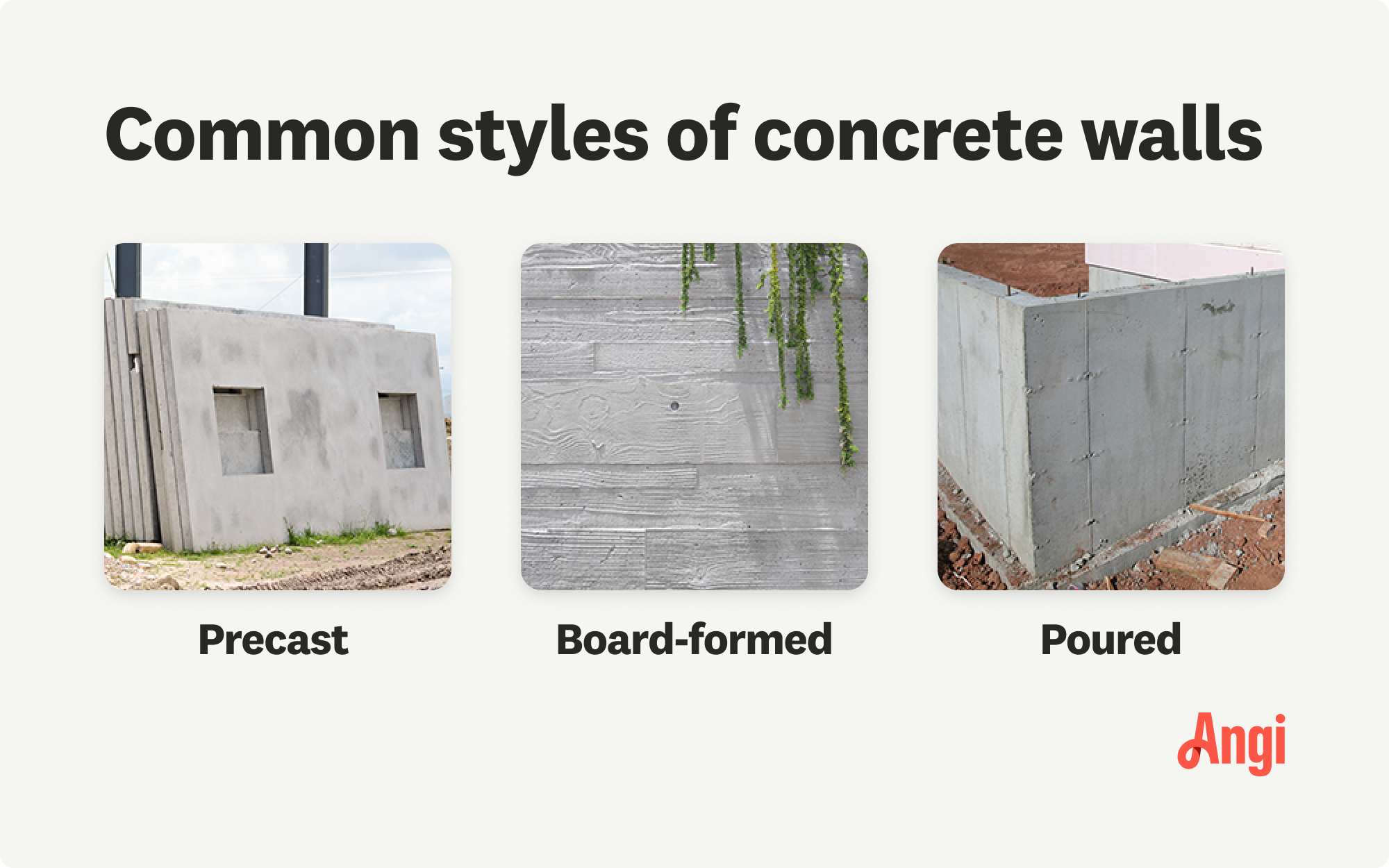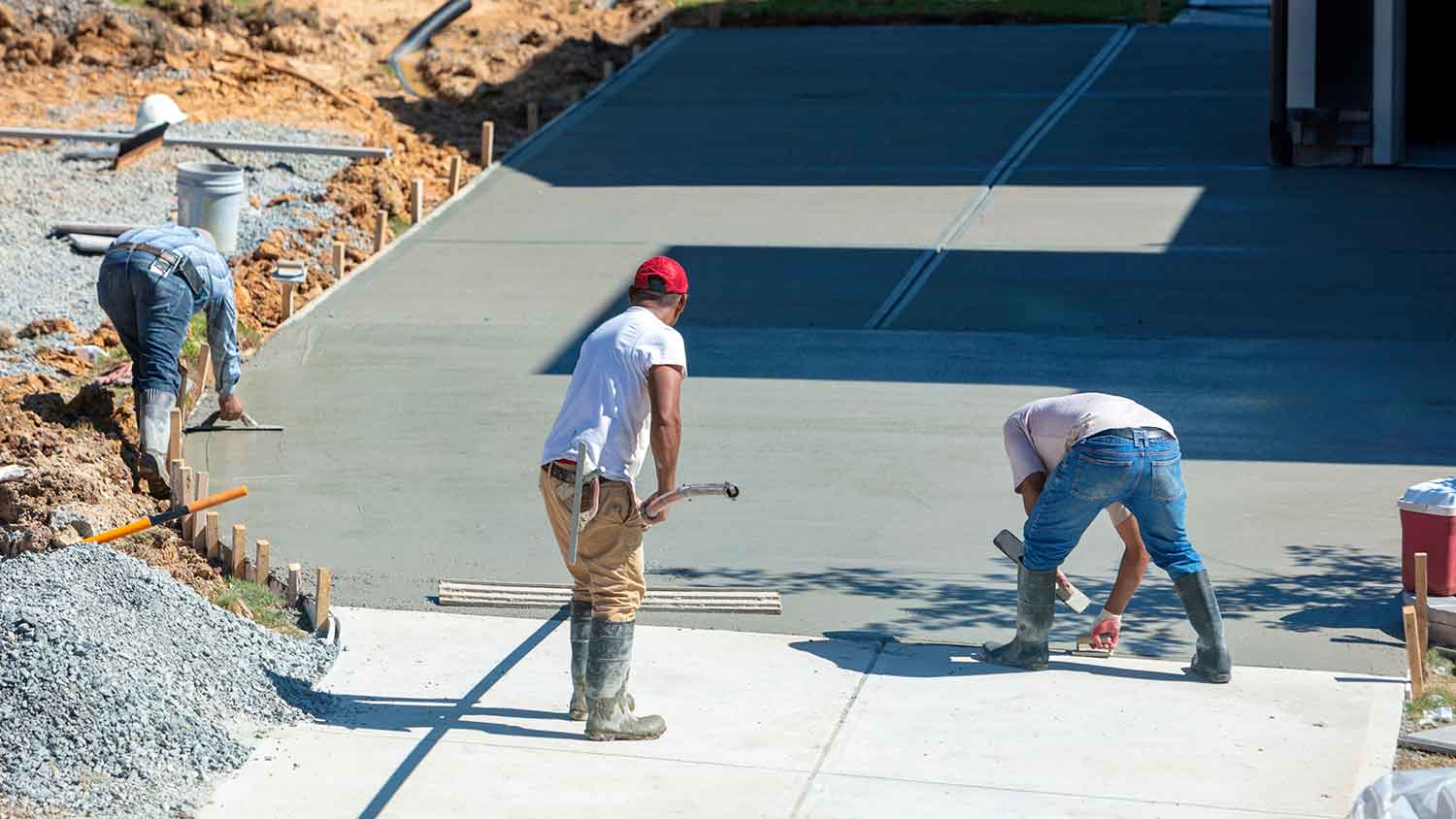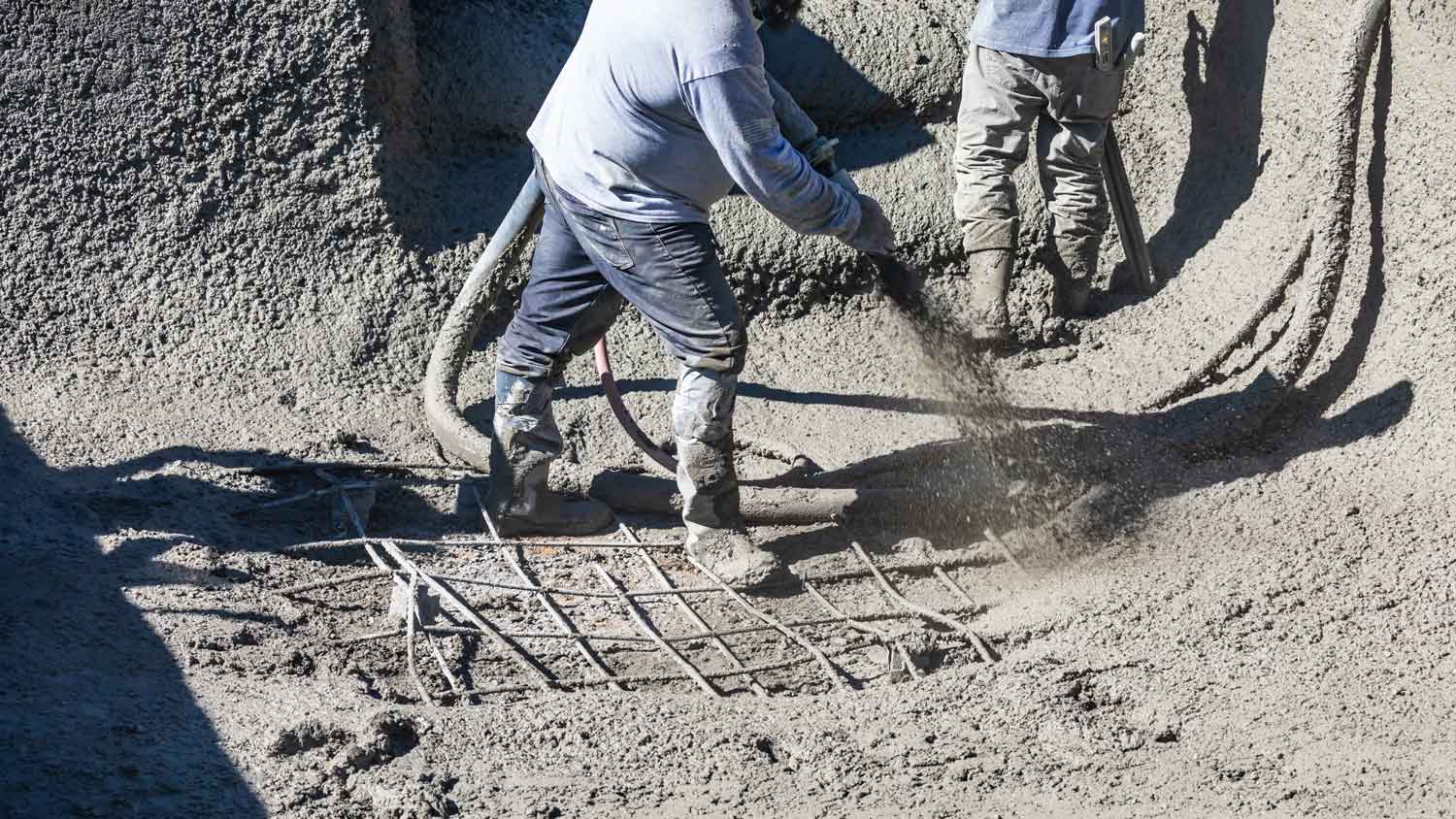
Looking to spruce up your home’s exterior and add some value? Use this concrete walkway cost guide to estimate the price of installing new paths.
Concrete repair costs depend on your project and location. Check with a local pro for your specific job.
The cost to install concrete walls depends on factors like their size, material, location, accessibility, reinforcement, and local labor rates.
Most concrete wall projects cost between $15 and $60 per square foot.
Materials make up 50% to 75% of the total cost to install a concrete wall.
A 32-foot wall starts at $480, while a 200-foot wall can run up to $12,000.
Expect to pay between $8 and $18 per square foot for labor.
Concrete walls can play many roles throughout your property. Decorative concrete fences may include stamped concrete to spruce up your property, while weight-bearing retaining or structural walls in your home come with a range of requirements. Let's break down the costs of these various kinds of concrete walls.
Concrete walls can cost anywhere from $10 to $100 per square foot but average closer to between $15 and $60 per square foot for most projects. You’ll also find wall projects measured in linear feet, with cost ranges depending on the height of the wall, which often falls between 2 and 8 feet high.
The wide range accounts for both poured and pre-cast concrete wall costs, the latter of which costs less due to decreased labor. The thickness, availability in your area, and type of materials in the wall will all sway the price as well. With this average range in mind, let's look at some common wall sizes.
| Square Footage of Wall | Cost Range |
|---|---|
| 32 ft. | $480–$1,920 |
| 48 ft. | $720–$3,600 |
| 80 ft. | $1,200–$4,800 |
| 100 ft. | $1,500–$6,000 |
| 160 ft. | $2,400–$1,920 |
| 200 ft. | $3,000–$12,000 |
Materials will account for between 50% and 75% of the total cost of a concrete wall. A common material list includes installation equipment, framing tools, and the concrete itself. Additions to your concrete wall will add to the total project cost.
Brick, stone, and stone veneer are popular choices for installing over-poured concrete. Prices range vastly for building materials and depend on the size of your site and what styles you choose. Let's break it down.
At least half of the cost of a concrete wall will go toward labor prices. Precast walls will drop the labor price since contractors build preset sizes off-site, but you may end up paying more for delivery down the line.
On average, labor costs between $8 and $18 per square foot or between $35 and $40 an hour. Labor costs increase for specialized designs, reinforcement, and advanced land preparation.
In most areas, you will need to obtain a building permit to build a wall inside your home or around your landscape. Permit costs will range anywhere from $150 to $2,000.
Concrete availability where you live, as well as the standard cost of labor, will sway the price as well. Installing an indoor concrete wall in a major city will naturally cost more than installing a wall in a small town. Here are some common concrete wall prices around the country.
| City | Cost Range |
|---|---|
| New York | $3,200–$17,000 |
| Los Angeles | $2,700–$16,800 |
| Miami | $5,500–$9,900 |
| Seattle | $3,900–$16,100 |
| Denver | $3,500–$14,000 |
The accessibility of the construction site accounts for several price factors. Firstly, accessing hard-to-reach areas in your home, removing load-bearing walls, or working on extreme slopes can all contribute to a higher labor price. Additionally, access to concrete and the contractor are also key to keeping prices low.
Concrete walls that live below grade—such as for foundations and basements—will require land clearing and excavation before construction gets started. Built within the cost of a foundation, excavation can add between $2 and $10 per square foot.
Exterior walls may require a few methods of drainage to manage how water flows around or below them on your landscape. Overall, you'll pay an additional $10 to $100 per linear foot for drainage. The large range accounts for the many types of landscape drainage designs. French drains cost between $10 and $50 per linear foot, while trench and channel drains reach up to $100 per linear foot.
The majority of concrete walls require either wire mesh or rebar for reinforcement. While contractors will include these prices in the total estimate, assume that rebar accounts for between $1.40 and $2.55 per linear foot.
Flat-fee delivery will typically cost between $110 and $150 per cubic yard for poured concrete walls. Precast wall delivery jumps up to between $150 and $320 per cubic yard, even though you'll pay less for the concrete wall itself.
The type of concrete wall will heavily affect its cost. Each wall has a unique manufacturing, delivery, and installation cost.
Precast concrete walls cost 23% less than poured concrete walls. Overall, you'll pay between $1,600 and $8,000, or an average of $4,800. The materials cost $20 to $40 per square foot or between $150 and $320 per linear foot.
Keep in mind that labor is often cheaper, too, as it doesn’t require as much to install precast concrete on-site. Precast concrete is manufactured in molds to create panels that specialists easily put into place.
Poured concrete walls are the most common and versatile, as they can fit any customized shape or project. Because of this, poured concrete wall costs vary widely. They cost between $10 and $25 per square foot, or an average of $2,900 to $10,400 for a foundation wall and up to $30,000 for a full basement.
This design style is more modern, with wooden boards placed on wet concrete to add unique patterns to the final project. Since these walls require more engineering and material, expect to pay $30 to $50 per square foot or between $60 and $280 per linear foot.
Stamped patterns on a concrete wall add finesse to an otherwise blank slate of material. The process can also make the concrete look like brick or natural stone. You'll pay between $8 and $28 per square foot for a stamped wall, depending on the complexity of the design.
Block concrete—also known as cinder blocks—can also build a sturdy and versatile wall. You'll pay between $10 and $15 per square foot, or an average of $1,300 for a concrete block wall. Not only is building a concrete wall a potential DIY option, but it also serves as a quick fix for landscaping walls when you're in a hurry.
The cost of a retaining wall runs a bit higher since it plays a vital role in retaining a part of your landscape, often on a steep slope. Concrete retaining walls cost between $30 and $50 per square foot, including installation. These walls almost always require reinforcement and landscape alterations.

One of the perks of a concrete wall is the minimal maintenance necessary to keep it strong, but issues can pop up along the way. Here are some upkeep and repair costs to consider if you want to extend your wall's longevity.
Concrete walls in a crawl space or basement will often require waterproofing. Basement waterproofing costs will average $5,000, or between $5 and $10 per square foot. You should also reseal your basement walls every 10 years. This process will cost between $1 and $8 per square foot.
Cracks, crumbling, and discoloration can all happen to concrete walls over time. Prices widely depend on the issue. A general inspection will run you between $150 and $300, repairing medium-sized cracks will cost about $200, and adding supports for a bowing basement wall costs an average of $4,500.
Concrete walls are highly customizable. Special features, such as paint, doors, or gates, will all affect your bottom line. Here are some options to consider.
Add color or a clean white finish to your concrete wall with specialized paint for between $1 and $3.50 per square foot. The look is ideal for the exterior of foundation walls as well as fences and retaining walls.
Doors in exterior walls or concrete fences are also popular choices. Cutting concrete to add a door costs an average of $3,000, including the cost of the door itself and its hardware.
The cost to install a gate falls between $200 and $7,900, depending on its size, material, and design.
You may also choose to install landscape lighting to your concrete wall, a job that costs between $100 and $400 per fixture. If you're handy at home, this may be a doable DIY, but keep in mind that you will need to know how to drill into concrete in most cases.
As you consider who to hire to install a concrete wall, talk with each prospective contractor about your budgeting options. In addition to choosing the right team for the job, there are some surefire ways to cut costs.
Consider precast concrete over poured concrete whenever possible.
Book your project well in advance and outside of the busy spring DIY season.
Handle preparation and cleanup by yourself, particularly landscaping.
Consider block walls for exterior projects when possible.
Keep the wall design simple and avoid specialty add-ons.
While DIYing a concrete wall can help you save on labor, you’ll need a design plan, a solid understanding of the land grading, knowledge of structural reinforcement, and more. Not to mention, concrete is heavy, so trying to do this without help can be dangerous. For these reasons, we recommend that you find a professional concrete installer near you to do the job.
Installing a concrete wall is a complex project. Here’s why it’s best to hire a pro:
Pros know how to prevent common mistakes like cracking, bowing, and structural failure.
Hiring a reputable pro ensures your wall will be up to code and comply with local zoning requirements.
Experienced pros have the tools, training, and equipment to safely and securely install a concrete wall.
DIY installation can lead to problems like uneven foundations, water intrusion, and collapse.
Experts can complete the job faster and more safely, providing high-quality results.
If you still want to get your hands dirty, consider helping out with the project by:
Cleaning up the project area before and after the installation
Moving materials and organizing tools for easy access.
Completing light landscaping around the wall after structural work is complete
Painting or staining the wall after installation
Have a clear idea of the type, size, and design of the concrete wall you want to install.
Provide the contractor with general structural requirements, like the size, height, and location of your wall.
Consider whether you want to incorporate add-ons such as stone facing, stamped textures, and integrated lighting.
Leave room in your budget for unexpected labor fees, material price increases, or permits.
Home is the most important place on earth, which is why Angi has helped more than 150 million homeowners transform their houses into homes they adore. To help homeowners with their next project, Angi provides readers with the most accurate cost data and upholds strict editorial standards. We survey real Angi customers about their project costs to develop the pricing data you see, so you can make the best decisions for you and your home. We pair this data with research from reputable sources, including the U.S. Bureau of Labor Statistics, academic journals, market studies, and interviews with industry experts—all to ensure our prices reflect real-world projects.
Want to help us improve our cost data? Send us a recent project quote to [email protected]. Quotes and personal information will not be shared publicly.
Allie Ogletree contributed to this piece.
From average costs to expert advice, get all the answers you need to get your job done.

Looking to spruce up your home’s exterior and add some value? Use this concrete walkway cost guide to estimate the price of installing new paths.

Concrete is a durable material but needs maintenance every few years. Use this concrete resurfacing cost guide to get an idea of ongoing maintenance costs.

Discover the average concrete pumping cost, including key price factors and tips to help you budget for your next concrete project.

Concrete resurfacing is a much more affordable option than replacing a slab. Learn how long concrete resurfacing lasts and if it’s a better option for you.

Learn about the average cost of shotcrete, including installation, labor, and material expenses. Discover how to budget, save, and select the right pro.

Concrete efflorescence can affect the stability of structures. Learn about concrete efflorescence, including ways to repair it and prevent it from happening in the future.